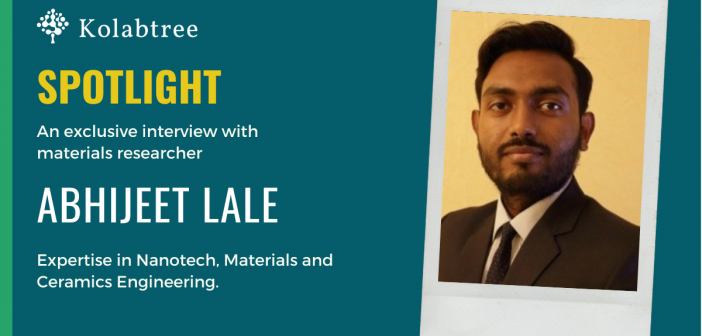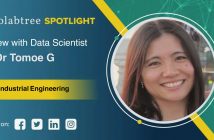Kolabtree’s freelance scientific consultant and materials scientist Abhijeet Lale talks about his academic journey, freelancing amidst the pandemic and how businesses can cut costs and optimize solutions by tapping into the rapidly growing global freelance scientific network.
A scientific consultant, Dr. Abhijeet Lale holds a PhD in Physical Chemistry and was a postdoc researcher at the Institute of Research for Ceramics (IRCER), Limoges. He will be starting a Materials Engineer position with Lithoz GmbH in Vienna, Austria next month. He has vast experience in ceramic processing through traditional powder metallurgy and novel polymeric routes along with in-depth knowledge of metal processing, metallurgical processes and materials chemistry.
A keen problem solver, he actively takes on product-related research and has been involved in freelance projects on Kolabtree for the last 18 months. His subject areas include nanotechnology, ceramics engineering and materials engineering.
As part of the Spotlight series, I had the opportunity to chat with Abhijeet about his work as a materials scientist, academic and scientific journey, freelancing amidst the pandemic and more.
NM: When did you first start showing an interest in science? Walk us through your academic and career journey so far.
AL: I’d say my interest started quite early. My father is an engineer, and so we had a lot of tools soldering iron kits lying around. I spent a lot of time playing around with them, and that basically started my interest in science and science-y things. Of course, being an Indian, you only have two choices in high school – maths or biology *laughs*. I ended up picking math, and then went on to do both my bachelors and masters from IIT Madras, in metallurgical and materials Engineering.
NM: What made you pursue a PhD?
AL: I was always inclined towards core jobs more than non-core. After my masters, I went on to do an internship at the National Institute of Materials Science in Japan. That three month stint doing research really made me realize that this is what I love doing, so the next obvious step would be to do a PhD. So, I studied for a PhD from the University of Montpellier in France, focusing mostly on ceramics.
For the past three years, I’ve been doing a postdoc from the University of Limoges. There’s this place called Institute of Research for Ceramics (IRCER), and it’s basically a massive hub for ceramics activity in Europe with a huge cultural significance too. Limoges has historically been known for ceramics throughout France and Europe, so there was that connection between what I was studying and where I was studying it.
NM: How did your freelancing journey begin? How would you compare it to your academic work?
AL: I started freelancing last year, mainly because it allowed me to gain industry experience and exposure. In that sense, it was an opportunity for me to branch out from purely academic work, and do something different.
In academia, you’re mostly looking at the broad picture – working on cutting edge stuff. So, you’re not really solving any immediate real-world problem. You’re working on a lot of interesting stuff, but not a lot of it is related to actual products going to market. When you freelance, you get to work with companies creating products and taking them to market.
Right now I’m in academia but even when I go into the industry, I think I’ll still take up freelancing so that I can dabble in different fields and earn a considerable amount of income on the side. You’re not really utilizing all of your skills in your day job, so you can use them while freelancing.
NM: How would you say businesses can utilize the growing network of freelancers in science and academia?
AL: Well, take small and medium sized businesses, for instance. Most of them would probably not be able to afford an in-house R&D team, so hiring a freelance scientific consultant might be an optimal solution, with people in academia bringing their own unique perspectives into the business side of things. Hiring a person working in academia for a short term can also prove useful in terms of providing insight and strategies on product development, rather than spending time and costs building a specialized development unit for this.
Businesses can also hire scientists with niche expertise to work on their projects, instead of scouting and hiring someone specialized full-time. This is a double edged sword in some cases, though. When you operate within a niche spectrum, you might find yourself pretty limited in terms of the scope or amount of projects you end up working on. But when you find that perfect project, it ends up being really interesting.
NM: What do you think is key for business owners and freelancers to work together optimally?
AL: I think it depends on the team and people you’re liaising with in the company. Take my most recent project on Kolabtree, for instance. The engineering team I worked with knew what they wanted to achieve and had realistic expectations, which made the job easier. In general, when you know what your client’s vision, budget and constraints are, that helps keep you grounded and produce an optimized solution to the problem. So yeah, I think it’s important to get that conversation out of the way before beginning the project.
NM: How has remote working impacted you in general? How have you found the transition so far?
AL: I’m an experimentalist in general, so this has impacted me a lot. My working hours have reduced since I’m not able to go onsite as much as I need to, so I need to prioritize what I do. Scheduling with other scientists and technical personnel needs to happen well in advance, in order to ensure everyone’s onsite when you need them.
In terms of freelancing, the lockdowns have obviously affected the scope of the projects I can take on. Since traveling onsite or to labs is impossible, I can only take on advisor or consultancy projects. I cannot conduct experiments if the project needs real world data for its progression, even though I have the expertise, since I don’t have the setup to hire a lab amidst global lockdowns.
NM: Do clients understand these limitations? What do you think clients need to do in order to source freelancers more efficiently?
AL: I think a more curated project description always helps. This will help the freelancer understand precisely what the client wants and adjust their proposals accordingly. For instance, a recent project I was recommended had too much data that was not formatted properly, and it was hard to comprehend what exactly the client wanted. Sometimes, this also creates a situation where the freelancers are not quite sure what expertise needs to be highlighted in the proposal to make sure it’s relevant to the client. A short and precise project description will help attract more relevant bids and make sure the clients and freelancers are on the same page in terms of what the project requires.
NM: How do you think the pandemic has changed the way business owners search for niche scientific and subject matter expertise?
AL: For smaller companies, hiring freelancers has always been an optimal cost-cutting solution, as well as a means to find personnel with a very specific academic niche. I’d say the pandemic has definitely made it easier for them to scout and hire freelance scientific consultants, since everything is going remote. Businesses can simply hire an expert to assist with the developmental stage of a product, since they won’t need a freelancer beyond that stage. They can always re-hire them in case any product re-iteration is required, so they have that degree of flexibility in the hiring process.
Most technical consultancy companies are quite big, so most small and medium sized businesses cannot always afford to hire consultants from there. These consultancies are also more management-oriented and have very specific skill sets, so maybe you won’t find it easy to find someone to work on the developmental side of things there.
That’s probably why they’re more likely to look on freelance platforms for this type of expertise, and the pandemic and lockdowns have accelerated this development.
Read more about Abhijeet Lale or contact him directly for a project here.
This piece is part of Kolabtree’s Spotlight feature, where we showcase the lesser-known aspects of our extensive network of freelance scientific consultants, writers and other PHD-qualified experts who are available for on-demand hire
Looking for expert help? Post a project for free on Kolabtree or scout from our wide network of freelance experts.







